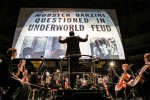Listening to the iconic film scores of John Williams and other greats struck passion into 7-year-old Justin Freer. He knew he wanted to conduct the sounds accompanying the screen.
On Saturday, the UCLA alumnus stood at the podium at the Segerstrom Center for the Arts in front of an orchestra and packed theater, conductor’s baton in hand.
Freer, conductor and co-founder of CineConcerts, said his desire to preserve and share film music with the public inspired him to start a company that pairs live orchestral performances with film screenings. CineConcerts’ Saturday screening of “The Godfather” balanced a cinematic fan favorite with live music that was played alongside the film’s dialogue track.
After receiving his bachelor’s and master’s degrees in music composition from UCLA, Freer conducted and wrote music for films such as “Avatar” and “The Day the Earth Stood Still.” Freer’s love for film music started at age 7 when he received two albums from his grandfather, including “The Best of John Williams and the Boston Pops Orchestra” on request.
“After hearing these albums I knew right away that was what I wanted to do: compose music and conduct,” Freer said. “I’ve been studying since then.”
[Related: UCLA music lecturer, film score composers release CD ‘Montage’]
Selecting films for CineConcerts requires a mix of passion and practicality. Freer selects the musical scores for their artistic appeal. But at the same time, some of the greatest film scores come from more obscure movies that might not draw in big crowds, he said.
Brady Beaubien, CineConcerts co-founder, said his business acumen helped with the logistics of CineConcerts, and in developing the business and advertising shows. Freer provided connections within the professional music community and his understanding of musical performance.
Freer also possesses an understanding of the nuances of how to book shows, how to sell a show and how to pick a project that will excite both the philharmonics playing it and the audience, Beaubien added.
“Justin has a bibliographic mind for music,” Beaubien sad. “As a classically trained musician, he is always surprising me with stories and expertise on instrumentation.”
Placing the orchestra prominently on the stage as “The Godfather” was projected in the background directed the audience’s awareness to the variety of musical styles in the film, from Italian folk music to big band, said Rob Frear, principal trumpet player for the performance.
The film’s music captures the emotions of each scene and helps create different moods for the each location in the story, Frear said. In scenes involving death or violence, the rapid bow movements and plucking of violin and cello strings heightened the tension of what was on screen.
The sweeping, grand strings played during the New York scenes are replaced by the swinging horns of a big band sound when the scene shifts to Nevada, where the characters try to break into the casino business, Frear said.
The performance consisted of a full orchestra, with a variety of instruments from an accordion to a mandolin to bassoons. All the music heard is played live save for the pianola at the beginning of the second act, Frear said. The pianola is played by director Francis Ford Coppola and is part of the film’s audio track.
[Related: Students work with Francis Ford Coppola on new genre of multimedia]
“‘The Godfather’ is such an incredibly iconic movie and the thing about the music is that it really typifies the emotional content of the scenes,” Frear said.
During moments like the opening wedding scene, the orchestra on stage mirrored the instrumentalists on film. Freer raised his baton and the instrumentalists sat up straighter and turned their eyes away from the screen in anticipation of each new song. The music matched the original film recording exactly – except it was not being pumped through speakers.
Audience member Robert Serna attended because he was interested to hear the film’s score performed live, he said.
“It was really interesting because the orchestra was so spot-on that you would sometimes forget they were there,” Serna said. “The live format is definitely better than hearing the recorded music on a home speaker.”
[Related: Tempo of Terror: The essential role of soundtracks in horror films]
Freer said he believes CineConcerts has been successful in preserving film music and increasing public appreciation for film scores. After performing “The Godfather,” “The Gladiator” and “Harry Potter and the Sorcerer’s Stone” live there is only room for expansion of its performance library, Freer said.
“A lot of us don’t quite know how powerful music is in film and what it does for film,” Freer said. “That’s one of the fantastic experiences of these concerts – to see people after the concerts and talk to them, and hear from them that they had no idea how much music meant to that film.”

Excellent article!!